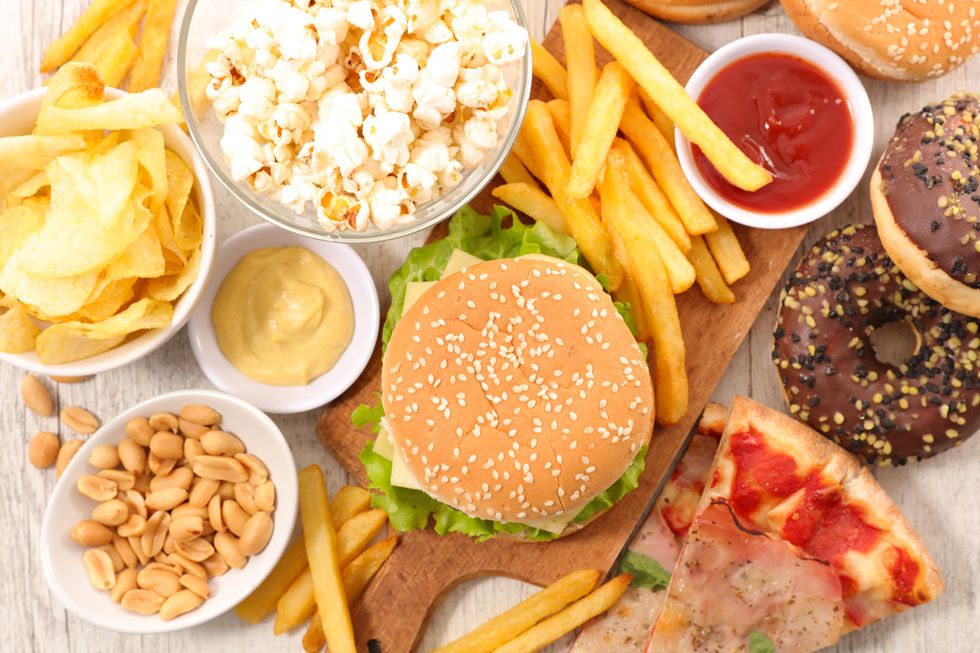North Americans are generally unhealthy. We're sort of aware of that, but here are some statistics to put it in perspective. Approximately 37.9% of U.S. adults (20 years and older) are obese. Over 70% of U.S. adults are overweight. Thankfully, the percentages are lower for children. Of children between the ages of 12-19, 20.6% are obese.
There are a lot of factors that contribute to children being generally healthier regarding food compared to their parents and other adults. Think about it: as children, you don't usually have a lot of say over what or how much you eat. Not to mention that children are growing and are generally more active than adults. Even teenagers are less active than younger children.
When we become adults, suddenly we have a lot of say in what we eat. With the exception of being a guest in someone else's home, you get to decide when, what, and how much food you eat every single time. And apparently, a lot of us can't handle that kind of responsibility.
But there isn't just the physical aspect of our relationship with food. Our relationship with food also affects us spiritually.
James 4 ties in nicely with the topic of food, although food isn't usually what we think of when we talk about this passage. James is rebuking the Jews for their idolatry and worldliness. Of course, there are likely idols James is referencing that have nothing to do with food. Nonetheless, our unhealthy relationship with food is yet another way that we look like the world around us. Why?
One of the things that has struck me the most about my own relationship with food is the way that my schedule is built, somewhat, around food. When I wake up, one of the things I absolutely have to do is make breakfast. When it's between noon and one o'clock, I need to eat lunch because I won't be able to eat again until after five o'clock. If I feel hungry, I eat. If there are cookies, it is almost as hard to say no as if I've been fasting for 40 days and Satan just offered me bread.
In the section section of James 4, James rebukes the Jews for their arrogant thinking: the thinking that they have control over their every day. They make plans and schedules without any regard for their lives the way the Lord sees them, as vapors, or for the Lord's will.
This is not just a challenge regarding our relationship with food, but the other idols in our lives that slyly dictate our schedules. Food should not be the dictator of our day (neither should work, school, etc.). Only God should hold that power.
Our necessity to eat certain things at certain times in excessive amounts is a testament to where our focus is. A reliance on food tells the world around us that we don't have a God who fulfills all our needs and is our strength.
As a result of this conviction, I stopped eating lunch. I have only been doing this for two weeks, so I am not even remotely an expert on destroying the idol of food, and there are a lot of other changes I could make in how I view and approach my relationship with food.
But now I'm not just eating because it's "lunch time". I'm telling my body what to do, not the other way around. I've realized that I don't need to respond to that first feeling of hunger, or the second, or the third. In the middle of the afternoon, my hunger disappears. I don't need lunch to have enough energy. (I do eat a small snack if I feel my energy diminishing.)
Self-control is a fruit of the spirit, and this is something else that can apply to our relationship with food. We often look at self-control as how we react to things and if we have control over our emotions. But it's also about if we have control over bodies, which we know are temples for the glorification of God (1 Corinthians 6:19).
Do we eat just because we want to? Do we eat a lot of "comfort food"?
What about why we scroll through Instagram or why we sleep in?
Guess what I have to face head-on now that I stopped eating lunch? Hanger. By the time dinner comes around, I'm hangry. That is a testament to my lack of self-control, and that food has more control over my emotions than my relationships with Jesus or other people do.
Self-control is the conscious discipline of giving over to Christ our need to be in control. We let Christ have control over every aspect of our lives: our relationship with food, technology, work, etc. As a result, Christ becomes preeminent as these unhealthy addictions disappear and transient idols are destroyed.
Our money, time, and focus will be better placed as Christ gains supremacy in all areas. The thing about food, social media, work, school, etc., is that these are idols are ingrained into our every day schedule. They are things that are harmless in and of themselves, so it is first difficult to recognize them as idols, and even more difficult to do something about it.
Maybe you have a healthy relationship with food, unlike me. Maybe you aren't easily tempted by cookies and carrot cake, and maybe you really only eat when you're actually hungry and need the sustenance. If so, are there other ways that small, seemingly harmless, things can become idols for you? Are there things in your life that have slyly taken control of your schedule and have acquired more of your attention than the Great Provider?





 mr and mrs potato head
StableDiffusion
mr and mrs potato head
StableDiffusion










